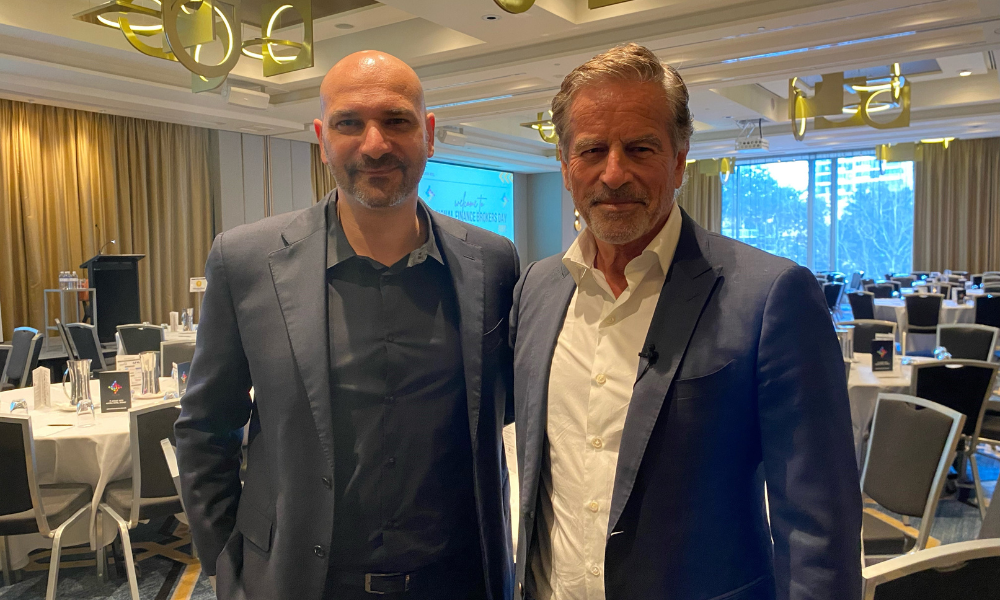Speaker Mark Bouris tells brokers value add is crucial for success

Respected entrepreneur Mark Bouris has shared some key insights on conversations brokers should be having with their clients in front of a packed room at the 2022 National Finance Brokers Day.
Possessing a wealth of knowledge picked up from a 35-year career in the mortgage finance industry, the executive chairman of broker aggregator Yellow Brick Road was the keynote speaker and a major drawcard for the 200 people that attended the event at Sydney’s Amora Hotel on Wednesday.
Established in 2015, National Finance Brokers Day (NFBD) is in its seventh year, an annual event which founder Dino Pacella (pictured above left), said was centred on continuing to build awareness of the broking channel. The 2022 event was the first full-day program and the first to be held in person following COVID.
A wide cross section of brokers, lenders, aggregators, bankers and consumers took part in NFBD, with participants from across the country attending.
Read next: Questions at the ready for National Finance Brokers Day
Speaking to MPA, the official media partner for NFBD, Pacella, who is also the manager of third party relationships at Marketplace Finance, said participants were able to celebrate their achievements over the last 12 months and promote their work with other like-minded professionals.
“It’s really great to be able to not only tick the box in building the awareness of the broking channel, but also to take time to celebrate the industry that we’re in,” Pacella said.
Bouris (pictured above right and below) shared his views on property, interest rates and inflation in a presentation about investing in today’s property market.

The former founder and chairman of Wizard Home Loans, spoke about the importance of brokers being “on top of their game” in what he acknowledged was increasingly becoming a tougher market.
Bouris said in an environment of decreasing house prices and rising interest rates impacting serviceability, the amount of money lent per transaction may be less.
If people were borrowing less, brokers were required to either produce more transactions, or live off a reduced upfront fee and trail, he said.
As each broker was effectively aiming for a greater share of a shrinking market, Bouris said the way to succeed (or remain successful), was to add value.
“We have to not only outperform everybody else: we have to outperform the system and the way you do that is through the value add,” Bouris said.
Value add was about explanation: making people feel like they understood something, he said. It was about having a conversation about the “current narrative” in the marketplace: house prices, auction clearance rates, the number of houses for auction, dwelling price falls in various marketplaces (relevant to the customer), vacancy rates and rental yields.
Conversations could be in person, over the phone, in email, and through social media channels, he said.
Rather than read different commentators’ interpretations of the facts, Bouris suggested brokers go direct to the source, reading the RBA’s monetary policy statements immediately after they were released so they knew what was actually said.
Brokers could then add value by adding context, whether via an email, socially or calling relevant customers directly.
As an example, Bouris suggested customers (including potential customers) may want to know why the RBA’s target range for inflation is 2% to 3%.
“Another value add is to give it sense, to say to clients that the general view of our Reserve Bank is they like to have real interest rate of ‘net zero’...that means if the cash rate is 2.5%, and if inflation is 2.5%, the net real interest rate, is zero,” Bouris said.
“The Reserve Bank’s position in normalised times, is to be net zero (closer to 1% but nowhere below zero and not above 1%).”
Assuming the RBA’s desired position was for inflation to be 2.5%, Bouris said at a minimum, by the end of the calendar year, the cash rate (currently 1.85%) should be 2.5%. That is the lowest of the range that people could expect to see, assuming the interest rate changes made to date are effective, he said.
Read next: Cash rate catapults to new high
“Once you explain something to a customer, you put them at ease … you want your customer to feel you’re someone who is the hand of reason in uncertain times – that’s the value add,” Bouris said.
CoreLogic is a credible source of property information, Bouris said. He also recommended the commentary of Coolabah Capital Investments co-chief investment officer Christopher Joye on the property market, and commentary by Market Economics managing director and economist Stephen Koukoulas, on interest rates.
While Koukoulas thinks house prices will stabilise (a 10% or 12% correction), Joye says there will be a 20% correction, Bouris said. Both were based on data, and both provided different views.
Bouris said current dysfunction in the property market was driven by conditions where there was not a willing buyer and a willing seller. Buyers were willing, but they were not prepared to pay the seller’s price.
“The reason we have a dysfunctional market is that vendors don’t need to sell yet - they have not met the buyers’ price, and what determines the buyer’s price is that we can’t arrange a loan equal to what they need to get to buy at the vendor’s price,” Bouris said.
As a rule-of-thumb, for every half a percent retail interest rate increase (as a result of RBA cash rate increases of 0.50%), lenders will lend 5% less, he said. For example, if interest rates go up by 2% (four lots of 50 basis point rises), that’s a 20% reduction.
“That’s another conversation, another value-add with a client … it’s about looking for conversation starters,” Bouris said.
“As a broker you must be confident (know your products and client’s details), but you’ve got to add value in this tougher market.”
Summing up National Finance Brokers Day, Pacella said he hoped all of the attendees took value from the fantastic line-up of speakers and actions they could implement within their business to help them grow.
“Outside the running of a business, it becomes critically important, whether from a mindset perspective and health and wellbeing, that you need to sit down, step out of the business and [say], ‘this is why I’m working’: it’s not just about writing loans,” Pacella said.
He also hoped that brokers identified opportunities to diversify beyond purely residential lending, whether that be through asset, consumer or commercial lending.
“I’d love to see that residential market share hit around the 75%, 76% by the end of next year, but I also want to see our commercial market share increase beyond 30%, 35%,” Pacella said.
The event was well publicised on social media, and this year, many of the brokers attending the event brought clients along, Pacella said.
“It’s coming together for the good of the industry … whether you’re an aggregator, a broker, a banker or a consumer, we’re all equal and here to benefit from each other and grow this fantastic industry.”
Former Sandstone Technology CEO Michael Phillipou was event MC. Other speakers at National Finance Brokers Day included Astute Ability Finance Group founder and principal Mhairi MacLeod; mindfulness advocate and shareholder and director of Nectar Mortgages Peter Gilchrist; co-founder of Cohen Handler & Costi Cohen and Cohen Farquharson, Simon Cohen and business partner Tas Costi; Infinity Group Australia director Graeme Holm and retired Australian freestyle skier Jacqui Cooper.
NFBD was also supported by Capital Bridging Finance, Clear Credit Solutions, Loan Market, Marketplace Finance, La Trobe Financial, Fuzion Capital, MoneyMe, Kubio, CAFBA, Lend, Social Broker, Affordable Staff, MyState Bank, Nectar, Earlypay, Brokers’ BackOffice, Property Powerhouse and Uptick Marketing.



